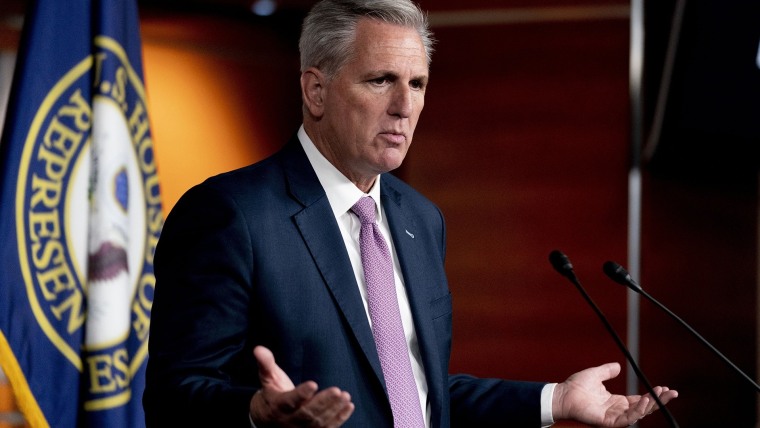WASHINGTON — House progressives showed their hand, and they weren’t bluffing.
They held the line in a weeklong standoff with Speaker Nancy Pelosi, who reversed course and canceled plans to vote on the infrastructure bill, with the support of President Joe Biden. He told House Democrats the votes weren’t there to pass that bill without the larger social policy bill.
The move enforces a link between the two pillars of Biden’s agenda, which Democratic leaders want to finish by the end of October. But for progressives, the real fight is still to come: securing a deal on the multitrillion-dollar bill that meets their high bar of transforming the safety net and winning the votes of nearly every Democrat on Capitol Hill.
The negotiations have intensified in recent days. Biden told Democrats the initial $3.5 trillion price tag would have to fall, and that the talks ranged up to $2.3 trillion, a source familiar with the meeting said. Centrist Sen. Joe Manchin, D-W.Va., floated a $1.5 trillion counteroffer that some decried as being too small. And Sen. Kyrsten Sinema, D-Ariz., has declined to say publicly what she’d back, frustrating her colleagues.
Biden is set to meet with a small group of House Democrats on Monday, including the Congressional Progressive Caucus chair, Rep. Pramila Jayapal, D-Wash., and the former caucus co-chair, Rep. Mark Pocan, D-Wis.
Pelosi’s reversal Friday came after Jayapal corralled about half the 95-member caucus to oppose the legislation if it came to a vote, fearing that centrist Democrats would try to shrink or sink the larger bill if the infrastructure proposal became law.
‘It was a social club’
It was a rare show of power for a caucus that has historically been disorganized and had a reputation on Capitol Hill for getting rolled by party leaders.
“It was a social club,” Jayapal told NBC News. “Now it’s a really strong caucus with an identity, with a set of values … I think members have seen that our strategy is successful. If we stick together, then we can really have power to fight for the things that we said we’d deliver to people.”
Now she hopes to follow it up by driving a hard bargain on the substance of the safety net bill, which she’s quick to note is not the caucus’s agenda, but rather Biden’s agenda. It includes an expansion of Medicare, enhancements to Obamacare subsidies, cash payments for raising kids, universal pre-K and tax hikes on the wealthy.
“We still have to get to the negotiation,” she said. “I do think [Biden] also brought a dose of reality to all of us, right? That even if 96 percent agree, there are 4 percent of us who still don’t agree and we all got to get on the same page.”
Jayapal took over as sole chair of the caucus in January, as part of a series of rule changes that included eliminating a co-chair, requiring members to support certain bills and actually attend meetings. Her goal was to take positions as a bloc and condition their votes on their priorities being addressed.
Her strategy was bolstered by the fact that House Republican leaders pressured their members to vote “no” on the bipartisan infrastructure bill, which made progressive votes indispensable.
“We are seeing the beginning of the rejection of neoliberalism,” said Rep. Ro Khanna, D-Calif., a deputy whip of the progressive caucus, who credited its executive director, Mike Darner, as well as Jayapal, for “keeping the troops together.”
Ezra Levin, a co-founder of the progressive activist network Indivisible, said the caucus is “almost unrecognizable from when I worked for a progressive member a decade ago.”
“In my time in congressional politics, I can think of literally no previous instance of the Progressive Caucus leading on top priority negotiations like this — but there Jayapal is, meeting with the president and holding the line with congressional leaders,” he said. “It’s what advocates have dreamed of for years … and now here it is in the real world changing the contours of what’s possible.”
Senate Minority Leader Mitch McConnell, R-Ky., said the delayed vote was proof that the party in power could not govern, as he fights to scuttle Biden’s social policy bill.
“Democratic leaders are letting the radical left run Capitol Hill,” he said in a statement.
Sinema issued a scathing statement Saturday blasting the House’s delay of the infrastructure bill, calling it “an ineffective stunt to gain leverage over a separate proposal” and insisted she would not “trade my vote for political favors.”
But to progressives, her anger was validation that their strategy was working. Sinema, an author of the infrastructure bill, is politically invested in its passage.
And holding the two bills together will require placating moderate Democrats who are upset that the infrastructure vote was postponed.
“There’s progress waiting to happen, and it’s not happening,” Rep. Abigail Spanberger, D-Va., said.
Source: | This article originally belongs to Nbcnews.com











